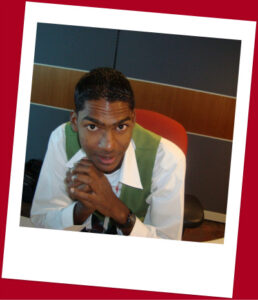“Sport moves from being a thrill to watch to being an opportunity”
July 23 On 25 July, governments will meet in London to consider how sport can contribute to advancing vital development goals. The 6th Commonwealth Sports Ministers Meeting will review how all types of games can address social and economic challenges and promote global public health.
On 25 July, governments will meet in London to consider how sport can contribute to advancing vital development goals. The 6th Commonwealth Sports Ministers Meeting will review how all types of games can address social and economic challenges and promote global public health.
But why is sport so important for national development? According to Ryan Bachoo, 22, a Commonwealth Correspondent from Trinidad and Tobago, it has the potential to boost jobs, improve economic revenues and bring people together.
We live in a world where every minute of every day someone, somewhere, is playing sport. Down the years, with the introduction of different mediums such as newspapers, radio then television, sport has become more and more commercialised.
Yet there are many arguments that sport isn’t playing a pivotal role in the way countries are developed. This could mean only two things: either countries are not marketing sports properly or governments are not investing in their sports fraternities wisely.
Sports open up much more opportunities than just for individual men and women. Here’s an example: Trinidad’s sister isle, Tobago, up to two weeks ago, after close to fifty years since our independence, had never hosted a single regional sports event. In May of this year, the island bid to host the West Indies Cricket Board’s Under 17 Championships, which was played between July 1st and 7th 2012.
Prior to the selection of which nation would host the tournament, the Project Officer of the West Indies Cricket Board, Rawl Lewis, went across to examine the facilities and grounds in Tobago. The initial report sent in three months before the tournament was due to start stated the facilities were not up to international standards, and the grounds were not suitable for international cricket.
At the end of the report, the last paragraph stated: “However, the people of Tobago seem very interested in hosting this tournament. I am not just talking about the government. The people heard we were coming to examine and they all came out from towns and villages across the island. They took down notes on what was expected of the facilities and grounds, and have promised to work on every flaw I pointed out. I will give them 45 days to get the facilities and grounds up to the required standard, and if they can do that, we will hand the inaugural games to Trinidad’s sister isle.”
I live in Trinidad, so I didn’t see what happened over the next four days but when I went to Tobago to the cover the tournament, which was eventually granted to them, the experience left me stunned. Tobago is an island of 54,000 people. When we got to the airport, public buses took us straight to our hotels. At the grounds, men and women virtually lived there to ensure it was kept up to standard, even if the rain fell. There weren’t many stands, but they erected temporary tents that protected visitors of the sun. They based people at the ground whose job was to solely keep visitors and media comfortable.
So the question is not really how big an investment should governments make into sports, but merely how we can make sports work for us. The result for Tobago was close to a 10% increase in tourism to the island, even before that figure was expected to rise with the summer holidays approaching. The result was job creation, a great deal of revenue coming in, an historical time for the island hosting its first such sporting event, but the best part for me was seeing so many thousands of people come together for one common purpose.
I stood and I watched a young lady usher people around a ground with no seats for one week, with no pay. I talked to her after the games and she said, “This isn’t about me. I don’t get anything from this. This is about Tobago. We’ve never had a chance to host anything this big before, and we got this chance, and if we can make it a memorable experience for everyone attending, even with all the challenges, then I think next time people will say, ‘Tobago can do it. They’ve done it before’.”
This is just one instance. But, like I said, when marketed properly and sold to the right audience, sport moves from being just a thrill to watch to being an opportunity waiting to be capitalized.
…………………………………………………………………………………………………………………
About me:
I’m a journalist and public relations officer from Princes Town in Trinidad and Tobago. I currently work with the West Indies Cricket Board.
I am currently working as a broadcast journalist for Cable News Channel 3. I also write on various talking points and current problems facing the world including international politics and the issues of a depleting economy.
…………………………………………………………………………………………………………………
Opinions expressed in this article are those of the author and do not necessarily represent the views of the Commonwealth Youth Programme. Articles are published in a spirit of dialogue, respect and understanding. If you disagree, why not submit a response?
To learn more about becoming a Commonwealth Correspondent please visit: http://www.yourcommonwealth.org/submit-articles/commonwealthcorrespondents/
…………………………………………………………………………………………………………………



